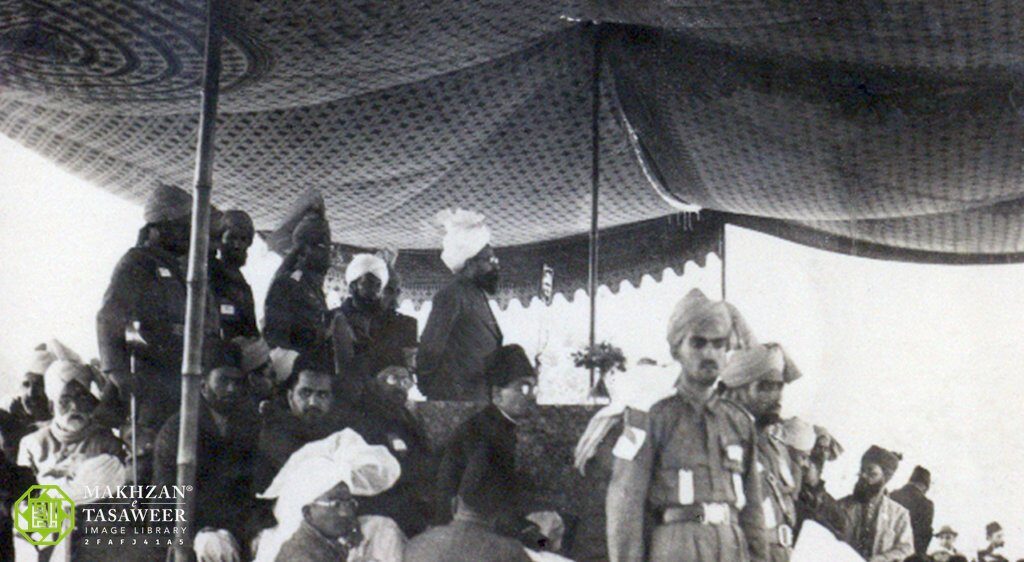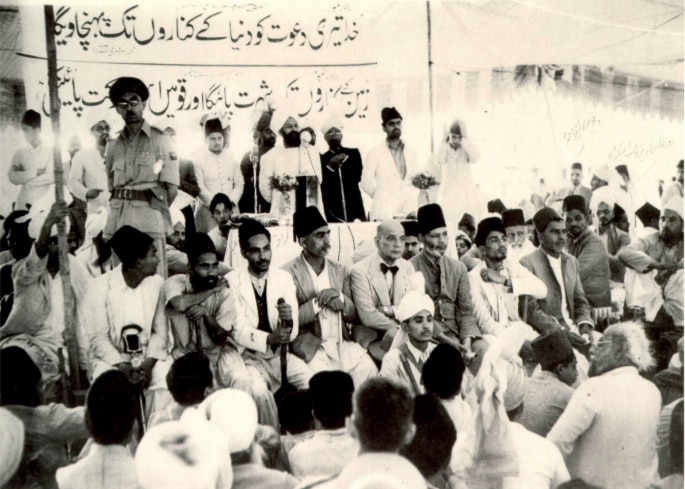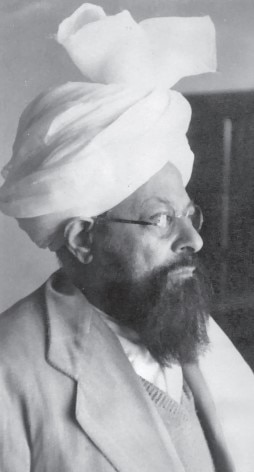Ata-ul-Haye Nasir, Al Hakam

During his Friday Sermon on 10 October 1919, Hazrat Musleh-e-Maud, Mirza Bashiruddin Mahmud Ahmadra shed light on the true essence of bai‘at [pledge of allegiance] and the importance of obedience.
Huzoorra said that once a person pledges allegiance to God’s chosen one, it becomes incumbent upon them to follow his directions without making any excuses since his directions are in accordance with the commandments of Allah the Almighty.
Huzoorra further said that one should never consider the commandments of Allah to be a “request” to His servants, but rather, they were in the form of an “order”, since He is the Creator and Master of this universe, and thus mankind is required to show obedience and submission to Him.
Huzoorra continued by saying that God Almighty “is not a man-made king, but rather He has been the King since the time even before you or your forefathers existed. He has been the King even before the creation of Adam, the progenitor of mankind. He has been the King even before the creation of the earth and the creation of the smallest particles, which helped in the formation of the earth. His rule is neither due to being elected by us, nor does He govern as our subordinate, but rather whatever we have gained, belongs to Him. For this reason, His commandments are orders, [so as to say] ‘I have given you this command, now it is your duty to obey it.’ […]
“As far as worldly governments are concerned, it is commonly believed that they belong to the public. […] Whatever authorities a government holds, are obtained from the lower level [public], whether with their consent of heart or just in a contrived way. […] If the whole public denies [to follow] a certain ruler, they can never be retained under the rule. No government could ever rule over such people.
“However, the Kingdom of God is not of such a kind. Even if all of the people refuse to accept His Divinity, He would never withdraw from it, but rather He would say, ‘You are denying it today, but will have to accept it one day’. The world denied Him, however, He said, ‘You will have to accept me one day’.
“He chooses a person from among the people to glorify His Kingdom, and proclaims, ‘I will make you accept My Kingdom through this person’. In regards to that [chosen] person, the people say, ‘He is inferior to us and holds a lower status, he neither possesses any wealth nor any big following and government’. [However,] God says, ‘Well, I will make you accept [My Divinity] through that very person’.
“At last, the world begins to obey him [God’s chosen one], since he is granted the [spiritual] kingdom by the King, who is Qadeem [ever-existing], Qadeer [All-Powerful], Khaliq [Creator], and Malik [Master]. Since he serves as His vicegerent, one should not say ‘no’ to his directions either.” (Khutbat-e-Mahmud, Vol. 6, pp. 313-314)
Huzoorra further said:
“Therefore, the one who has taken the bai‘at, should not say, that ‘I cannot do such and such thing’, since they have surrendered their freedom themselves [at the hands of God’s chosen one]. If one says, that ‘I cannot do this’, then what is the meaning of doing bai’at at the hands of God and His subordinate? In reality, they do whatever their nafs [heart] desires, and upon finding anything against their nafs, they say, that ‘I cannot do this.’” (Ibid, p. 316)
Huzoorra continued by saying that if one pledges allegiance at the hands of God’s subordinate, but still does not follow the pathway taught by him, it indicates that they are being controlled by the desires of their nafs:
“Until one fulfils the desires of God and follows the pathway taught by Him, the claim of bai’at is worthless. […] It is the duty of a believer to fulfil the responsibility given to them, and they are not expected to say that they have no interest in that specific task or are not eligible for it. Supposedly, even if they are not eligible but intend to fulfil the responsibility for the sake of God, then, seeing their pious intention, God Almighty will grant them the ability to do so. God will grant them courage, and His succour will come in their support.” (Ibid, p. 317)
In the end, Huzoorra prayed:
“May Allah the Almighty enable you to understand this, and instil in you such obedience as He desires to create within His servants. Amin.” (Ibid, p. 318)

During his Friday Sermon on 17 October 1919, Huzoorra said:
“A believer should always strive to protect themselves from the tricks of Satan, and to occupy themselves in prayers to God with humility, so that they may not be engrossed by arrogance and ego at any point in time and be ruined. The example of the one seeking God, is just like the person swimming in a fast-flowing river; continuing with courage will guarantee their safety, however, the slightest of negligence would cause them to stumble and water would engulf them.” (Ibid, pp. 325-326)
During his Friday Sermon on 31 October 1919, speaking about giving precedence to one’s faith over the world, Huzoorra said:
“The beauty and attractions of the world seem very endearing to one’s eyes, however, one has to sacrifice them for the sake of their faith. It is a huge trial, but one cannot enter into the fold of God’s loved ones, until one passes through it. […] Islam does not teach us to abandon the world completely, rather, it commands us to earn the world and work hard, but whenever one comes across choosing between the faith and the world, they should give precedence to their faith without caring about the world. […]
“The reformer, ma’mur [God’s appointed one] and Imam of this age has included this in the conditions of bai’at, that one should give precedence to their faith over the world. […] No one can purify themselves until they sacrifice the world for the sake of faith in accordance with the teachings of their religion.
“Until members of the Jamaat inculcate this mindset and spirit, true success cannot be achieved. Therefore, the world should never halt one’s religious obligations.
“Hence, I advise members of the Jamaat that if they desire to attain the nearness of God and wish to reap the fruits of Ahmadiyyat, they are required to give precedence to their faith over the world, and let the world serve the religion. If they do not do so, then their claims about Islam and Ahmadiyyat would be worthless.
“Thus, until one truly honours Islam and Ahmadiyyat, it would be meaningless to think that ‘we are Ahmadis’, since one can never succeed without practical efforts.” (Ibid, pp. 333-336)
During his Friday Sermon on 14 November 1919, Huzoorra said that one should never become arrogant for their knowledge and status:
“Remember, one’s knowledge, worldly and religious status, lineage — in short, none of these characteristics are of any avail before God. Anyone who shows arrogance about such things, is in the wrong. One is required to be humble in front of Allah, and to strive and pray for safeguarding their faith.” (Ibid, p. 342)
During his Friday Sermon on 19 December 1919, Huzoorra said:
Islam “has made it incumbent upon the Muslims to utilise their sagacity but within the moral and religious limits, and to freely assess a certain religion, but upon witnessing the truth they should submit to it. It is stated:
اَطِيۡعُوا اللّٰهَ وَاَطِيۡعُوا الرَّسُوۡلَ
“[Obey Allah, and obey His Messenger. (Surah an-Nisa, Ch. 4, V. 60)]
“Everyone has the right to express their points of view, however, once they come to know that a certain commandment is from God and His messenger, and from their successors, they are required to show complete obedience. […] Whatever commandments Islam has presented are necessary and inevitable for spiritual progress.” (Ibid, pp. 360-361)
During his Friday Sermon on 30 July 1920, Huzoorra said:
“Obedience is essential not only for religious progress, but for worldly progress as well. […] A common reason behind a person’s disobedience is arrogance on their part, and arrogance was the first sin that took place in the world. […] In addition to religion, even if we look from a worldly perspective, a nation that desires progress has no other way than obedience. If people had gone through the history of Islam, the way I have read it, they would have known that the reason behind the regress, humiliation, and deterioration of the Muslims was their abandonment of the spirit of obedience. When there is no obedience, discipline cannot be maintained, and when discipline breaks away, no nation can ever retain its prestige. […]
“In terms of material progress, Europe is far superior to us, and they also have good discipline and obedience. We desire to make Europe our follower, and this can only happen when we inculcate in ourselves the spirit of obedience and discipline more than they have. Do not merely say that ‘God has promised us that we will succeed.’ No doubt, God has made a promise to us, but we also hold some responsibilities.
“[In terms of worldly means], we are weak and have no status in front of Europe, therefore, if Europe is to become our follower – which will surely happen – it will be with the sheer grace of God, not through any human plans. However, it does not mean that we become negligent in our obligations. […]
“Therefore, I advise you all, and those who are outside [of Qadian] through the newspaper, that they should learn to show obedience, so that our Jamaat may succeed as soon as possible.” (Ibid, pp. 493-495)

During his Friday Sermon on 19 August 1921, Huzoorra said:
“The core teaching of Islam is for one to submit to Allah the Almighty, for this reason, we have been given the title of ‘Muslims’. […] The only method for attaining progress is for one to become a Muslim in its true essence. One cannot attain salvation by only following a specific commandment, but rather, by acting upon all of the commandments. If one disobeys or shuns even a single commandment of the sharia, they cannot be termed a [true] Muslim. […]
“Therefore, if one desires to attain success and progress, they should never disrespect any commandment of God. Until one is ready to leave aside their habits and customs for the sake of God, their prayers, fasting, and other deeds cannot make them a [true] Muslim.
“The true essence of Islam is for one to exhibit true submission even when their nafs is denying to do so. If one’s submission is not of such a level, and instead they give precedence to their habits and customs, then it is not considered the true essence of Islam. […]
“A Muslim, in its true essence, is the one who continues to be obedient. The one who, in addition to disobeying [the commandments], disrespects the religious teachings, can neither be called a [true] Muslim, nor become the recipient of any blessings or acceptance of prayers.” (Khutbat-e-Mahmud, Vol. 7, pp. 84-86)
In one of his couplets, while advising the Ahmadi youth, Huzoorra stated:
عقل كو دين پہ حاكم نہ بناؤ ہرگز
يہ تو خود اندھی ہے گر نيّرِ الہام نہ ہو
“Do not make the intellect rule over the religion, it is blind in itself if there is no light of revelation.”
Commenting on this, Huzoorra said:
“Everyone is obliged to believe in a religion after considering it to be true. […] However, once a person believes in the teachings [of a religion] after much certainty, they do not hold the right to argue its details if they do not align with their personal ‘intellect’. The spiritual system has been established by God Almighty, hence, there is no comparison between rationality and religion. In fact, if one puts rationality as a judge over the religion, it would mean to raise a question – God forbid – as to whether our rationality is better or God Almighty’s Knowledge. Though it is also essential to determine whether the matters attributed to the religion are actually a part of it or not.” (Lauh-ul-Huda, Anwar-ul-‘Ulum, Vol. 5, p. 193)
In another couplet, Huzoorra said:
تم مدبّر ہو كہ جرنيل ہو يا عالِم ہو
ہم نہ خوش ہوں گے كبھی تم ميں گر اسلام نہ ہو
“Whether you are a statesman, a general or a scholar, we will never be pleased if you do not possess Islam.”
Commenting on this, Huzoorra said:
“We will never be pleased if worldly progress is not accompanied by [firm] faith. Since if this were the true objective, then what was the need for us to accept Islam? In such a case, why should one not accept Christianity, which possesses all kinds of material means.” (Ibid)
At another instance, commenting on the verse 64 of Surah an-Nur:
لَا تَجۡعَلُوۡا دُعَآءَ الرَّسُوۡلِ بَیۡنَکُمۡ کَدُعَآءِ بَعۡضِکُمۡ بَعۡضًا ؕ قَدۡ یَعۡلَمُ اللّٰہُ الَّذِیۡنَ یَتَسَلَّلُوۡنَ مِنۡکُمۡ لِوَاذًا ۚ فَلۡیَحۡذَرِ الَّذِیۡنَ یُخَالِفُوۡنَ عَنۡ اَمۡرِہٖۤ اَنۡ تُصِیۡبَہُمۡ فِتۡنَۃٌ اَوۡ یُصِیۡبَہُمۡ عَذَابٌ اَلِیۡمٌ
“Treat not the calling of the Messenger among you like the calling of one of you to another. Allah does know those of you who steal away covertly. So let those who go against His command beware lest a trial afflict them or a grievous punishment overtake them.”
Huzoorra said:
“[Allah] states that the opinion of individuals does not hold any weight in front of the call of the Imam [of the time]. Whenever the call of the God Almighty’s messenger reaches you, it is your duty to say labbaik [‘Here I am, at your command!’] and to strive for its fulfilment, since herein lies the secret to your progress. […]
“Anyhow, it is essential to say labbaik in response to the prophet’s call, in fact, this is one of the biggest signs of the [true] faith. Due to the fact that the subject of Khilafat-e-Islamiyyah is being mentioned in the previous verses, and all commandments have been given in relation to the strengthening of the Islamic system, therefore, that subject continues in this verse as well.” (Tafsir-e-Kabir, Vol. 6, pp. 408-409)
Further, Huzoorra mentioned the battle of Uhud, and stated that the Holy Prophetsa had instructed a group of companions to secure a specific hill slope and to not leave it at any cost, even if the Muslims had achieved victory. However, after the victory, the companions asked their officer-in-charge to allow them to leave, and said that there was no need to stay since the victory had been achieved. When the officer-in-charge reminded them about the Holy Prophet’ssa instruction, they responded that “‘the Holy Prophet’ssa purpose was to merely advise us, now that we have achieved victory, we have nothing to do here.’ Therefore, giving precedence to their personal opinion over the command of God’s Messengersa, they left that hill slope, except their officer and a few soldiers.” (Ibid, pp. 410-412)
Huzoorra said that, sensing the opportunity, the opponents’ army attacked through the same hill slope, and consequently, the Muslims had to face a huge setback:
“In this verse, Allah the Almighty calls the attention of the Muslims towards the fact that those who do not show complete obedience to the commandments of Muhammad, the Messengersa of Allah, and give precedence to their personal interpretations over his commandments, should have some fear, lest as a result of this a trial afflict them or a grievous punishment overtake them. In other words, it has been said that if you desire to be successful, it is your duty to stand and sit in response to the movement of the hand [of the Imam of the time]. As long as this spirit remains within the Muslims, they will [spiritually] flourish.” (Ibid, pp. 411-412)
May Allah the Almighty enable all of us to act upon these golden principles. Amin.

